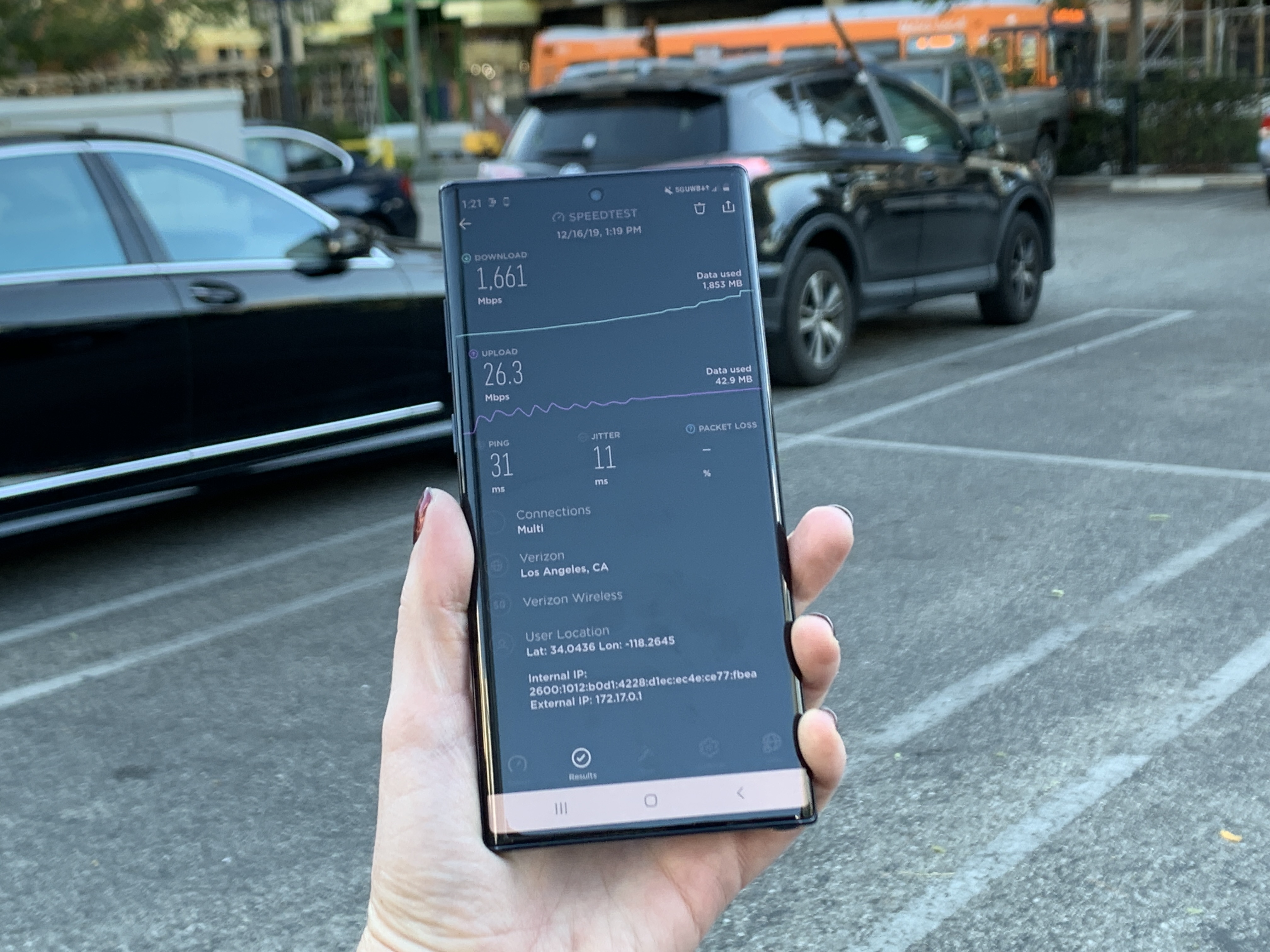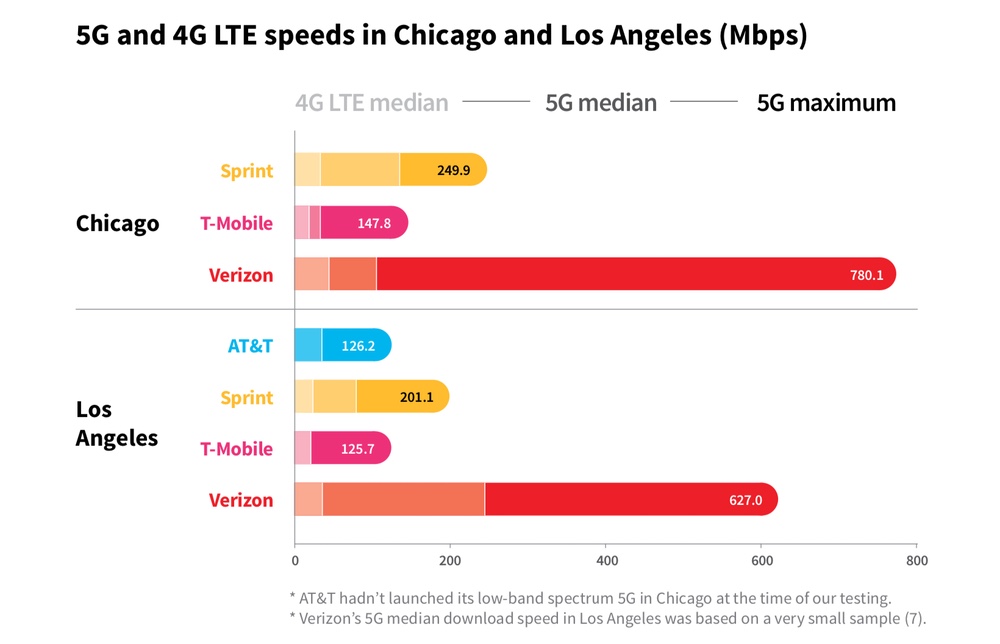5G testing: Verizon's network is fastest, but others have wider reach
Verizon tops RootMetrics' semiannual wireless network ratings once again

Wireless carriers spent 2019 rolling out 5G networks that mobile customers can now access. And as 2020 gets underway, network testing firms are beginning to release numbers that show the state of 5G network performance — at least in these early days of the new networking standard.
The numbers from testing firm RootMetrics look pretty good for Verizon. According to RootMetrics' semiannual report on carrier performance, Big Red can boast the fastest 5G speeds even if its 5G network doesn't enjoy the wider reach of other carriers.
That's not really a surprise if you've been following what the different carriers have been doing with 5G. Verizon's 5G network uses millimeter wave technology, which promises speeds approaching 1 Gbps. The problem with millimeter wave is that it doesn't extend very far, and it can't really penetrate physical obstacles. It's good for dense urban areas, but you have to be in view of a 5G tower to see those higher speeds.
AT&T, Sprint and T-Mobile are using mid- to low-band spectrum for the bulk of their 5G networks. (AT&T and T-Mobile have some cities with millimeter wave-based coverage, but it's not as widely available as those carrier's other 5G efforts.) You won't get those 1 Gbps download speeds — in some cases, you'll only see a modest improvement over LTE at this point — but you will get a network with extensive reach.
That's what RootMetrics found when it honed in on Los Angeles — a market where all four carriers have a 5G presence. Verizon's speeds were fast in the City of Angels, hitting a top speed of 627 Mbps in RootMetrics' report. Only Sprint, at 201 Mbps, got any faster than 200 Mbps. The other carriers could point to a broader coverage area, though, and the promise of faster speeds in the future.

In another result that Verizon is sure to tout, RootMetrics' tests in Los Angeles found that even Verizon's LTE speeds were faster than median speeds for T-Mobile's 5G network and equal to AT&T's median 5G speed. Again, those two carriers figure to improve the speeds of their 5G networks, but Verizon would counter that as widespread as their 5G footprint may be, you can get similar speeds from Big Red's LTE network.
It was a similar story in Chicago, according to RootMetrics, as Verizon outpaced other networks with a maximum speed of 780 Mbps. That topped Sprint's speed of 249.9 Mbps. T-Mobile's median 5G speed once again trailed Verizon's LTE performance in the Windy City.
Sign up to get the BEST of Tom's Guide direct to your inbox.
Get instant access to breaking news, the hottest reviews, great deals and helpful tips.
RootMetrics' results mirrored what we saw when we compared 5G performance for Sprint and Verizon in Chicago during last summer. Verizon's 5G speeds were blazing fast, though 5G coverage was limited to select neighborhoods. Sprint's coverage was more extensive, but it took us much longer to download TV shows and games when compared to Verizon's 5G network. (At the time of our testing, T-Mobile's nationwide 5G network hadn't yet launched in Chicago.)
There are some caveats to RootMetrics' 5G findings. Carriers are continuing to work on their 5G deployments, and the testing firm expects 5G service to improve and become more widespread as time goes by. Still, these results provide a handy snapshot as to where the carriers are in building out their 5G networks.
Overall, this RootMetrics report covering the second half of 2019 had a lot of good news for Verizon, which took top honors in five of the six categories the testing firm ranks; in the sixth for texting performance, it split top honors with AT&T. This is the 13th consecutive RootMetrics report where Verizon has taken the top spot overall.
AT&T can find plenty to boast about in RootMetrics' report of the second half of 2019. It finished second in five categories to Verizon and claimed the best national aggregate median download speed of 33.1 Mbps. Verizon was close behind at 32.7 Mbps.
RootMetrics found that T-Mobile's network reliability and call performance improved in the second half of the year, with its strongest overall performance in metropolitan areas. It had a national median download speed of 26.4 Mbps.
Sprint finished fourth in five out of the six categories RootMetrics tracks, and its aggregate median download speed of 23.1 Mbps was the worst of the Big Four carriers. RootMetrics still thinks any speed over 20 Mbps is fast enough for most users and it praised the carrier's texting performance.
RootMetrics based this report on nearly 3.86 million tests conducted by driving more than 225,000 miles in all 50 states. Testing was conducted during the second half of 2019.
Philip Michaels is a Managing Editor at Tom's Guide. He's been covering personal technology since 1999 and was in the building when Steve Jobs showed off the iPhone for the first time. He's been evaluating smartphones since that first iPhone debuted in 2007, and he's been following phone carriers and smartphone plans since 2015. He has strong opinions about Apple, the Oakland Athletics, old movies and proper butchery techniques. Follow him at @PhilipMichaels.

